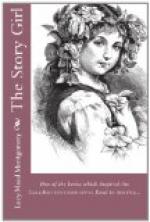“I wish I was twins so’s I could eat more,” said Dan, when he simply had to stop.
“What good would being twins do you?” asked Peter. “People who squint can’t eat any more than people who don’t squint, can they?”
We could not see any connection between Peter’s two questions.
“What has squinting got to do with twins?” asked Dan.
“Why, twins are just people that squint, aren’t they?” said Peter.
We thought he was trying to be funny, until we found out that he was quite in earnest. Then we laughed until Peter got sulky.
“I don’t care,” he said. “How’s a fellow to know? Tommy and Adam Cowan, over at Markdale, are twins; and they’re both cross-eyed. So I s’posed that was what being twins meant. It’s all very fine for you fellows to laugh. I never went to school half as much as you did; and you was brought up in Toronto, too. If you’d worked out ever since you was seven, and just got to school in the winter, there’d be lots of things you wouldn’t know, either.”
“Never mind, Peter,” said Cecily. “You know lots of things they don’t.”
But Peter was not to be conciliated, and took himself off in high dudgeon. To be laughed at before Felicity—to be laughed at by Felicity—was something he could not endure. Let Cecily and the Story Girl cackle all they wanted to, and let those stuck-up Toronto boys grin like chessy-cats; but when Felicity laughed at him the iron entered into Peter’s soul.
If the Story Girl laughed at Peter the mills of the gods ground out his revenge for him in mid-afternoon. Felicity, having used up all the available cooking materials in the house, had to stop perforce; and she now determined to stuff two new pincushions she had been making for her room. We heard her rummaging in the pantry as we sat on the cool, spruce-shadowed cellar door outside, where Uncle Roger was showing us how to make elderberry pop-guns. Presently she came out, frowning.
“Cecily, do you know where mother put the sawdust she emptied out of that old beaded pincushion of Grandmother King’s, after she had sifted the needles out of it? I thought it was in the tin box.”
“So it is,” said Cecily.
“It isn’t. There isn’t a speck of sawdust in that box.”
The Story Girl’s face wore a quite indescribable expression, compound of horror and shame. She need not have confessed. If she had but held her tongue the mystery of the sawdust’s disappearance might have forever remained a mystery. She would have held her tongue, as she afterwards confided to me, if it had not been for a horrible fear which flashed into her mind that possibly sawdust puddings were not healthy for people to eat—especially if there might be needles in them—and that if any mischief had been done in that direction it was her duty to undo it if possible at any cost of ridicule to herself.
“Oh, Felicity,” she said, her voice expressing a very anguish of humiliation, “I—I—thought that stuff in the box was cornmeal and used it to make the pudding.”




